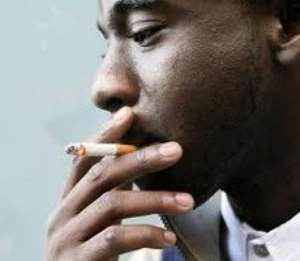
It is estimated that about 10% of the adult population in Ghana smoke cigarette, including 4.6% Junior High School students.
This was contained in a message signed by Ghana's Minister of Health, Alex Segbefia, on the occasion of the World No Tobacco Day, which marked every May 31.
This year's celebration was under the theme 'End Illicit Trade of Tobacco Products.'
The Minister noted that Ghana has signed the protocol on illicit trade information from World Health Organisation (WHO) and other sources indicate that the illicit tobacco market accounts for as much as one in every 10 cigarettes globally consumed.
Ghana has also passed a public health law (Act 851:2012) and completed its Legislative Instrument, which will soon be sent to Parliament.
It is estimated that about 10% of the adult population in Ghana smoke cigarette and 4.6% of junior high school students smoke cigarette (GHS, GYTS).
Among the interventions to address the tobacco use problem in Ghana, the Ministry of Health is on intensive public education through the media, sensitisation of in-service and pre-service health professionals, ministries, departments and agencies.
Also, textual health warning on cigarette packs and seizures and subsequent destruction of illicit tobacco products are being adopted.
The goals of the WNTD 2015 campaign are to raise awareness on the harm to people's health caused by the illicit trade in tobacco products, especially the youth and low-income groups, due to the increased accessibility and affordability of these products due to their lower costs.
Also, show how healthcare gains and programmes, tobacco control policies, like r. increased tax and prices, pictorial health warnings and other measures, are undermined by the illicit trade in tobacco products.
It is also to highlight how the illicit trade of tobacco products is a means of amassing great wealth for criminal groups to finance other organised crime activities, including drugs, human and arms trafficking, as well as terrorism.
Mr Segbefia added that the key public messages for this year's commemoration were that illicit trade of tobacco takes tax revenue away from the government, which could have otherwise been spent on the provision of public services, instead directing such funds into the hands of criminals.
The WHO called on countries across the globe to help end the sale of illicit trade of tobacco products as the world seeks to get persons informed about the effect of tobacco usage.
According to WHO, the European Commission estimates that illicit trade in cigarettes costs the EU and their Member States over €10 billion annually in lost tax and customs revenue.




 Former Kotoko Player George Asare elected SRC President at PUG Law Faculty
Former Kotoko Player George Asare elected SRC President at PUG Law Faculty
 2024 elections: Consider ‘dumsor’ when casting your votes; NPP deserves less — P...
2024 elections: Consider ‘dumsor’ when casting your votes; NPP deserves less — P...
 You have no grounds to call Mahama incompetent; you’ve failed — Prof. Marfo blas...
You have no grounds to call Mahama incompetent; you’ve failed — Prof. Marfo blas...
 2024 elections: NPP creates better policies for people like us; we’ll vote for B...
2024 elections: NPP creates better policies for people like us; we’ll vote for B...
 Don’t exchange your life for wealth; a sparkle of fire can be your end — Gender ...
Don’t exchange your life for wealth; a sparkle of fire can be your end — Gender ...
 Ghana’s newly installed Poland train reportedly involved in accident while on a ...
Ghana’s newly installed Poland train reportedly involved in accident while on a ...
 Chieftaincy disputes: Government imposes 4pm to 7am curfew on Sampa township
Chieftaincy disputes: Government imposes 4pm to 7am curfew on Sampa township
 Franklin Cudjoe fumes at unaccountable wasteful executive living large at the ex...
Franklin Cudjoe fumes at unaccountable wasteful executive living large at the ex...
 I'll 'stoop too low' for votes; I'm never moved by your propaganda — Oquaye Jnr ...
I'll 'stoop too low' for votes; I'm never moved by your propaganda — Oquaye Jnr ...
 Kumasi Thermal Plant commissioning: I pray God opens the eyes of leaders who don...
Kumasi Thermal Plant commissioning: I pray God opens the eyes of leaders who don...
